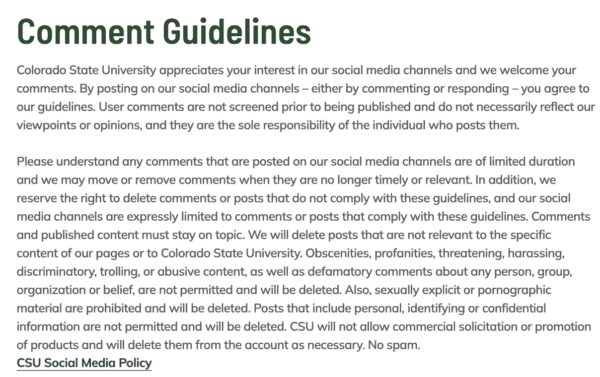Navigating Social Media Aggression: Safeguarding Your Brand’s Online Presence

Social media aggression has become an unfortunate reality for many businesses in today’s digital world. It’s no surprise that comment sections often become breeding grounds for negativity and hate. As brands, we often face a pressing question: How can we navigate this relentless aggression and protect our online presence?
What is Social Media Aggression?
Social media aggression is a prevalent issue that spans various platforms such as Instagram, TikTok, and Facebook within their comment sections and live streams. The anonymity and perceived distance of online interactions empower individuals to express negativity and aggression they might not display in face-to-face conversations. It’s important to note that social media aggression doesn’t discriminate; it can affect both personal profiles and businesses, putting their online presence at risk.
We’ve all seen it happen: a brand or individual posts a harmless photo on social media, only to witness the comment section transform into a breeding ground for hostility and unwarranted criticism. Negative remarks flood in, creating a toxic environment that impacts your brand and online presence. Thus, it is important for businesses to understand the underlying causes of social media aggression and its potential repercussions. By recognizing these factors, they can effectively manage their brand’s online presence.
The Phenomenon Behind Online Aggression
It’s important to recognize the psychological phenomenon known as the Online Disinhibition Effect to gain a deeper understanding of why social media aggression occurs. This effect reveals that people tend to behave differently online than in face-to-face interactions.
The Online Disinhibition Effect encompasses two distinct sides: the benign and the toxic. In the context of social media aggression, the toxic side comes into play. This side allows individuals to express themselves more openly, often resorting to rude language, harsh criticism, anger, hatred, and even threats they wouldn’t typically exhibit in face-to-face interactions. Numerous facets comprise the online disinhibition effect, each playing a role in understanding the occurrence of social media aggression.
Dissociative Anonymity
The first facet is dissociative anonymity. In an online environment, individuals can hide or alter their true identity, leading to a reduced sense of accountability for their actions. This sense of detachment from their real-world selves allows them to evade responsibility for their aggressive actions. The perceived anonymity shields them from the consequences they might face in face-to-face interactions, emboldening them to engage in aggressive behavior without the same level of restraint.
Dissociative Imagination
Another significant element is dissociative imagination, where individuals view their online presence as a separate game with distinct rules and norms from the real world. When they shut down their devices and return to their offline lives, they often consider themselves leaving behind the game and their virtual identity, thus disassociating themselves from any responsibility for their actions online.
Other Factors
Other factors at play include the minimization of authority, succumbing to a “mob mentality” where aggression becomes normalized and reinforced within a group, and the perceived lack of consequences on social media.
Effective Strategies for Handling Social Media Aggression
To effectively manage and mitigate social media aggression, businesses should consider adopting the following key strategies:
Publish a Public Social Media Policy
Establish a clear set of guidelines that explicitly state your zero-tolerance policy for trolling and aggressive behavior. For example, if you’re managing an Instagram account, you can create a dedicated highlight on your profile titled “Community Guidelines” or “Code of Conduct.” In this highlight, you can outline the expected behavior and set the tone for respectful engagement. This sets expectations for users and provides a reference point to address any guideline violations. By pointing back to these guidelines when deleting comments or reporting trolls, you ensure accountability and maintain the integrity of your platform.
If you have multiple social media channels, consider taking it a step further by incorporating your social media policy directly onto your website like Colorado State University does:
Utilize Platform Filtering Tools
Leverage the filtering capabilities offered by social media platforms to automatically hide or block comments containing inappropriate or aggressive keywords while also utilizing the option to block specific keywords to further enhance content moderation. Additionally, disabling comments altogether might be an option in certain situations. However, enabling comments fosters engagement, so consider using advanced comment filtering in conjunction with keeping comments on.
Instagram:
Instagram provides users with the ability to hide comments that are automatically detected to contain common offensive words, phrases, or emojis. By default, this setting is active. Instagram also offers advanced comment filtering, allowing you to block specific words and phrases to maintain a controlled environment on your account.
To access comment settings on Instagram:
- Click the three-lined More button, then click Settings.
- Click How others can interact with you on the left.
To filter keywords:
- Click Manage comment settings below Comments.
- Enter specific words, phrases, numbers or emojis you want to hide in the text box. Click Submit to save the list. Note: Separate each entry by a comma.
To turn on advance comment filtering or hide messages altogether:
- Below Hidden Words, you can:
- Click switch on next to Hide comments to turn it off.
- Click switch off next to Advanced comment filtering to turn it on.
TikTok:
TikTok provides a useful option to filter comments with a pre-approval system, allowing you to review and approve comments before they are visible. This additional layer of screening allows you to effectively address any aggressive or inappropriate comments that might bypass automated detection tools.
To access all commenting features on TikTok:
- In the TikTok app, tap Profile at the bottom.
- Tap the Menu button at the top.
- Tap Settings and privacy.
- Tap Privacy, then tap Comments.
- From there, you can select Comment filters or Comment management to control your comments.
Facebook:
Facebook page admins have the option to block up to 1,000 keywords, including emojis, from displaying in comments. Facebook also automatically hides variations of blocked keywords, such as misspellings and abbreviations, to ensure effective keyword filtering without impacting the 1,000 keyword limit.
To block certain words from your Page:
- From your Feed, click Pages in the left menu.
- Go to your Page, then click Settings in the left menu.
- From General, click Content Moderation.
- Add keywords that you want to block and click save.
Adopt an Appropriate Comment Handling Approach
While it may be tempting to respond in kind to aggressive comments, as a business, it is crucial to maintain professionalism. Delete malicious comments, block and report repeat offenders, and ignore trolls seeking to incite controversy. Choose your battles wisely, as engaging with every aggressive comment can tarnish your brand’s reputation.
Respond Empathetically
When appropriate, responding to aggressive comments with empathy can defuse tensions and turn negative interactions into positive ones. Acknowledge the concerns raised and express a genuine desire to address them. By showing empathy, you demonstrate that your brand values the opinions of your customers and is committed to finding solutions.
Monitor Social Media Activity With Management Tools
Employ social media management tools such as Sprout Social or Hootsuite to effectively track and respond to comments and replies. Staying on top of interactions demonstrates your commitment to engaging with your audience while swiftly addressing any instances of social media aggression.
Want to Avoid Aggressive Social Media Comments on Your Brand’s Social Channels?
Remember, building an engaged and supportive community around your brand is vital for countering aggression and ensuring a positive online experience for your business and customers. If you find it challenging to implement the aforementioned strategies due to time constraints or resource limitations, that’s where Online Optimism comes in. Our experienced social media team can help navigate the complexities of dealing with aggressive comments and provide the support needed to manage online aggression effectively. Learn more about our social media services, and contact us to get started today!

